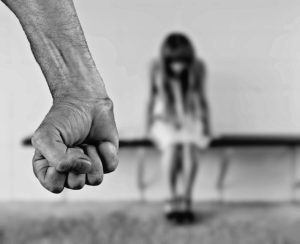The Bystander Campaign against domestic violence kicked off recently, and has been supported by the parents of murder victim Allison Baden-Clay.
Allison Baden-Clay’s parents say they were gradually cut off from their daughter in the months prior to her murder and wish they had done more to help her escape a controlling marriage. They said their daughter became increasingly isolated from friends and family before she was murdered by her husband Gerard Baden-Clay in 2012.
Mr Dickie said he hoped sharing his daughter’s experience would help other domestic violence victims.
“In Allison’s case, there were three main signs that were noticed over time: gradual isolation, control of finances and reduction in level of self-esteem,” he said.
“They are just three signs of many in which little things happened over a length of time that can be easily overlooked.
 The Allison Baden-Clay Foundation is partnering with Griffith University’s MATE Bystander Program, which trains people in how best to approach someone in an abusive relationship.
The Allison Baden-Clay Foundation is partnering with Griffith University’s MATE Bystander Program, which trains people in how best to approach someone in an abusive relationship.
Griffith’s program is targeted towards business and corporate environments to teach people how to identify and handle a domestic violence situation.
Domestic violence expert Professor Paul Mazerolle from Griffith University said social and financial isolation could often be early warning signs someone needed help.
“It’s very hard for a woman experiencing domestic violence or isolation to break through.
“It’s about educating people that these are warning signs, and that there’s an opportunity to intervene that’s sensitive and careful.
“We think having the conversation is worth taking the risk. Yes, these are private matters, but they can also be matters of life and death.”
The MATE Bystander Program is an education and intervention program teaching us all to be leaders in the prevention of violence and harmful behaviour.
The University says of the Bystander Campaign:
The Program is designed to teach community members how to recognise abuse and have the confidence to speak out and offer help. The Program aims to raise awareness of the level of abusive behaviour in our culture as well as the subtler issues that support a harmful and abusive environment. It aims to challenge the root attitudes, beliefs and behaviours that normalise problematic behaviour and create a safe environment for people to share their opinions and experiences about these volatile issues. Participants are asked and supported to think critically and personally (empathise) about these issues while opening in a dialogue about the dynamics and the context of all forms of violence.
The Queensland Government is spear-heading the the Bystander Campaign, which begins by saying:
Although we speak out strongly against domestic and family violence as a society, it continues because, as individuals, we often choose to stay silent.
When confronted with the signs of abusive behaviour, we can make excuses and downplay our instinct to step in.
Domestic and family violence won’t go away by itself – it needs our intervention to break the cycle.
It needs everyday Queenslanders to take responsibility for learning the signs and taking action to stop domestic and family violence.
How to be part of the Bystander Campaign
 The Queensland Premier’s Office has championed the Bystander Campaign, and the website offer the following information.
The Queensland Premier’s Office has championed the Bystander Campaign, and the website offer the following information.
Outsiders may never witness an abusive interaction, but instead notice a change in the victim, or have an instinctual feeling that something isn’t right.
Here are some signs that might help identify if someone is experiencing domestic and family violence.
If you notice these signs, it’s a signal that you should do something. They may:
- seem afraid of their partner or always very anxious to please them
- stop seeing you, other friends or family and become isolated
- become anxious or depressed, unusually quiet or less confident
- be denied adequate care if they are an older person or a person with disability
- have a partner who is controlling, obsessive or jealous
- have a partner who has threatened to harm them, their children or pets
- have a partner who continually phones or texts to check on them.
- have physical injuries (bruises, sprains or cuts on the body) and may give unlikely explanations for these injuries
- finish phone calls when their partner comes into the room
- be reluctant to leave their children with their partner
- suspect that they are being stalked or followed
- say their partner or carer gives them no access to money, makes them justify every cent that is spent or makes them hand over their money.
One of the key messages of the Bystander Campaign is that if you suspect someone is in an abusive relationship, your support is an important thing you can give them.
Even if your friend, family member or neighbour doesn’t want to discuss it, just knowing they have your support could help them:
- recognise abusive behaviour they might not have been aware of.
- strengthen their self-esteem and sense of self-worth.
- reach out to professional services to get help.
- develop the confidence to talk to you about it later.
Steps to having an effective conversation
- Think about what you’re going to say, and be prepared to respect the decisions they make.
- Know the support services available.
- Pick the right moment.
- Express your concern.
- Prepare for responses.
- Listen, believe, respect.
Your first instinct might be to try and ‘fix’ the situation. You might want to say:
- “I think you should leave him. He’s abusive”.
- “If it’s so bad, why don’t you leave”.
- “What did you do to deserve it, can you improve”?
But imagine how you’d feel if someone said this about your relationship? You’d feel embarrassed, humiliated, ashamed or angry. You’d feel the need to defend yourself, your relationship and your partner.
It’s important to listen to them without judgement, take the issue seriously and respect the decisions they make. They may be experiencing shame or embarrassment, or feel like hiding what’s going on from friends and family.
They need to feel supported and encouraged, so that they can make decisions that are best for them and their ongoing safety.
If you have questions about obtaining a separation or divorce, or obtaining protection from domestic violence, please give our friendly, experienced team a call today. We offer a free, 10-minute phone consultation.

